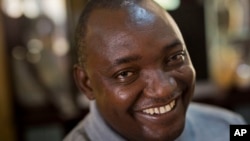U.S. Secretary of State John Kerry on Saturday congratulated Gambia and its new president-elect, Adama Barrow, on the country's first democratic presidential election, calling it "a new era in The Gambia."
Barrow handily defeated Gambia's president of more than 22 years, Yahya Jammeh, in the election Thursday, and Jammeh vowed to relinquish his position peacefully, calling the election results "a clear victory" for Barrow.
Kerry commended Jammeh for his willingness to respect the results and said he was grateful to the electoral commission for its transparent handling of the election.
"We call for unity and calm during this transition period, and urge the Gambian government to respect the rights of citizens to freely assemble and express their views on the election results," Kerry said in a statement.
Kerry said he looked forward to working with the new president to "promote democracy and governance" in Gambia, which has had long-standing ties with the U.S.
Gambia's electoral commission announced Friday that Barrow had won 263,000 votes, or 45 percent of the total, while Jammeh took 212,000 votes, about 36 percent. A third candidate, Mama Kandeh, won 17 percent.
Barrow, 51, represented a coalition of seven opposition parties that challenged Jammeh in Thursday's election.
Jammeh, also 51, has ruled the tiny West African nation since taking power in a military coup in 1994. He won four subsequent elections that critics said were neither free nor fair and supported a 2002 constitutional amendment that removed presidential term limits. He once said he could rule Gambia for "a billion years."
Rights groups have often accused Jammeh of having political opponents and journalists arrested or killed.
Amnesty International said in a statement Friday that the new administration would have an obligation to "transform the human rights situation in Gambia, freeing political prisoners, removing repressive laws and entrenching newly found freedoms."
Gambia is a former British colony that occupies a narrow sliver of land surrounded by French-speaking Senegal. About 880,000 Gambians were eligible to vote in Thursday's poll, which took place under a complete communications blackout, including social media platforms.
The president, who had predicted he would win, had said that no protests would be allowed after the election.





